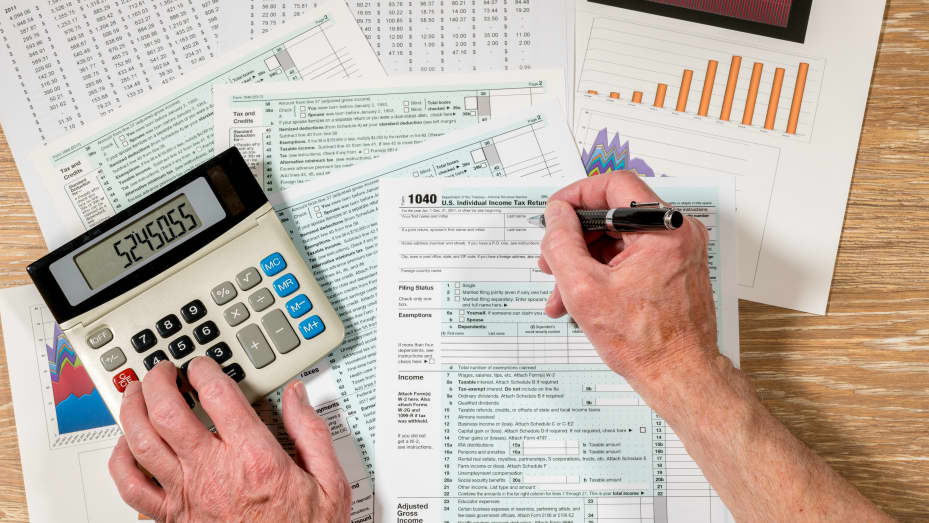Some people delay filing their taxes for one reason or another, especially if they know they owe money, however, you cannot ignore the deadline for filing taxes, because you will face civil or criminal penalties if you do not file a return, whether you are a company or an individual owner, and in our next article we will address the most prominent tax advice at the last minute so you have to file it on time.

Providing taxes as an individual owner
Offering income taxes as a sole owner is fairly simple, because individual ownership is not a separate legal entity from the employer, where income from work is treated as your personal income, meaning that the sole owner must provide any business income (profit minus expenses) in his personal income tax return.
What is individual ownership?
Individual ownership is an individual company with a single owner, there is no legal distinction between you and the company, which means that you are personally liable for all aspects of the project, including commercial debts, losses and liabilities, and if someone brings legal action against individual ownership, they are likely to pursue both commercial assets and the owner's personal assets.
The sole owner has unlimited personal liability, and unlike other types of business structures - such as limited liability companies, you don't have to submit any paperwork or pay any fee to establish individual ownership, and in fact, any new business with a single owner that is automatically individual ownership? For example, if you do independent work outside your normal job where you work full-time, this work is done under individual ownership if you do not prepare any other type of business entity.
What can a sole owner do and what can't?
There are some important restrictions on individual ownership that you should know to make sure you pay taxes correctly and to avoid any fines or fees:
As a sole owner, you can:
- Get your employer identification number (EIN) from the IRS to avoid sharing your social security number (SSN) with customers.
- Hire staff (if you have a personal identification number (EIN)).
- Integrate your personal, business and money holdings (although it's good to keep separate bank accounts for your individual ownership so you can track expenses more accurately, which you can claim as discounts on your tax return)
-Register your business name if different from yours.
- Own more than individual ownership (although you will have to report profits and expenses in separate C tables).
Last Minute Tax Manual and Infographic for Individual Owner
To help you streamline your tax deposit process and increase your savings, we invite you to use this tax guide at the last minute:
1. Important tax dates to remember
As a single business, you are likely to work with many customers and will receive tax receipts for work done throughout the year. Similarly, if you outsource work to another independent sole owner, you are responsible for claiming these payments on your taxes.
Here are some other important tax dates to remember as a sole owner:
Deadline for annual tax return
A tax return deadline is usually for any individual on a given day, according to your country's law, to avoid delay, make sure to seal your tax return by stamping mail or submitting it online at any deadline that applies to you.
Quarterly tax payments
The IRS requires payment of taxes upon earning income; This is especially true for individual owners, instead of having an employer for the luxury of withholding taxes from your salary and paying them on your behalf, you have to pay a portion of your earnings every three months.
Calculating your quarterly payments depends on your income tax and earnings segment, however, most experts recommend allocating 20% to 30% of your income to pay estimated taxes, it's best to consult a tax specialist or tax expert, who can help determine the best amount suited to your personal condition.
Deadline for extension of tax return
If you are requesting an extension to file a tax return, it must be sent by the date of application, in addition, even if you plan to offer an extension to your tax, you must still pay all (or most) of your outstanding tax balance by this deadline as well.
2. Tax fines
There are many different tax penalties that occur as a sole owner, and can occur for two reasons: if you miss the tax filing deadline or miss paying estimated taxes, each one varies depending on your type of situation, and the underpayment fee may be assessed if you do not pay taxes by the date of filing, or miscalculate and do not pay enough of the outstanding balance.
If you forgot to pay the discretionary payment by the quarterly maturity date The same penalty rules may apply to the deadline for filing taxes on quarterly late tax payments. and when possible, make all income taxes or estimated tax payments as soon as possible penalties ", because waiting would only add more fines and interest charges.
Last Minute Deposit Tips
Stalling taxes saves you less time to manoeuvre and correct errors, which can have huge repercussions, so you need to pay attention to depositing taxes on time, so you can follow the following tips:
- Make a plan to file on time, as submitting documents on time is crucial to avoid tax penalties if you are in debt.
- Use the tax setting checklist to make sure you don't forget any important information. You can create your own customized list.
- Review the latest changes to the tax code to avoid any surprises when applying.
- Make a payment plan and file taxes as soon as possible to help prevent failure to file and not pay fines.
- Find out what to do if you cannot pay taxes by the due date.
- Request an extension of time to file if you cannot set the deadline.
Conclusion:
If the tax filing deadline creeps into you, and you find that you're not quite ready, It is better to move forward and file taxes anyway and pay what you owe sooner rather than later You can amend your return later to give yourself extra time to correct any tax forms or additional expenses, This may cost you a $100 surcharge, but it will save you fines and interest fees for the IRS.
other topics:
reference
1. << Clarification on various issues relating to GST refunds>>, a2ztaxcorp
2. << GST refund process: Step-by-step guide on how to claim your rightful earnings>>, mintgenie.
2. << GST refund process: Step-by-step guide on how to claim your rightful earnings>>, mintgenie.

Add New Comment